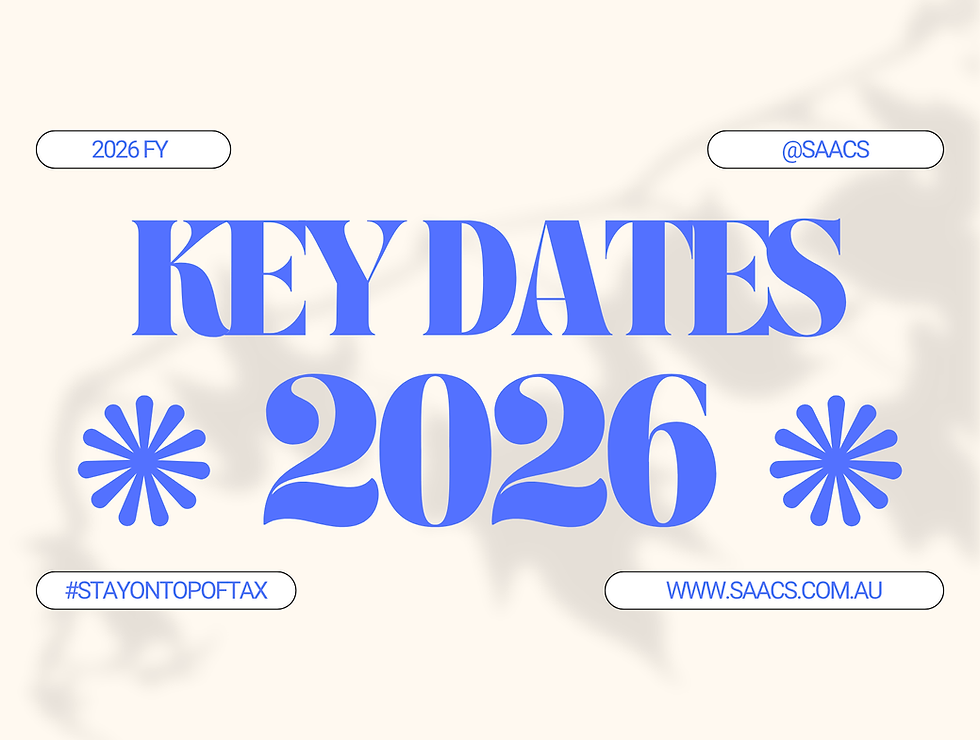#Taxtime 2022 For Small Business
- The SAACS Team
- Aug 2, 2022
- 3 min read
The ATO has recently flagged what it will be focusing on for small business tax returns for 2021–22. It has also released a small business tax time toolkit to assist small business taxpayers to complete their income tax returns.

ATO priority areas for small businesses
For small business tax returns 2021–22, the ATO will be focusing on:
deductions that are private in nature and not related to business income, as well as overclaiming of business expenses (especially for taxpayers running a home-based business)
omission of business income, for example income from the sharing economy or new business ventures
record keeping — including insufficient or non-existent records that are needed to substantiate claims.
Income
Assistant Commissioner Andrew Watson has reminded small businesses to include all income, including earnings from ‘side hustles.
Almost half of the 1.9 million sole traders also have non-business income, like salary and wages or income from investments, so make sure to double check that all non-business income is included.
Small businesses should include all income in their income tax return, including cash, coupons, EFTPOS, online, credit or debit card transactions, and income from platforms such as PayPal, WeChat or Alipay.
The ATO also reminded small businesses (including sole traders) in the building and construction, courier, cleaning, information technology, road freight, security, and investigation or surveillance industries that payment information is provided to the ATO through the taxable payments reporting system.
Most government payments or financial support received as a result of COVID-19 need to be included as taxable income, whereas some others are exempt and should not be included. The ATO website contains a list of how COVID-19 support payments should be treated.
Deductions
Mr Watson has reminded small businesses to only claim what they are entitled to, and that their business structure affects their entitlements and obligations.
There are three golden rules for what the ATO accepts as a valid business deduction:
the expense must have been for the business, not for private use
if the expense is for a mix of business and private use, only the portion that is used for the business is claimable
the taxpayer must have records to prove it.
The small business toolkit
The small business toolkit includes small business guides by the ATO key expenses for small businesses and will be the focus of their review.
What is covered in the toolkit fact sheets
The Home-based business expenses fact sheet will help a small business owner claiming deductions for the costs of using their home as their main place of business. In particular, it explains:
how the business structure may affect the taxpayer’s deductions for home-based business expenses
how to calculate deductions for running expenses, depreciation and occupancy expenses
CGT implications.
The Motor vehicle expenses fact sheet explains:
how the business structure may affect the taxpayer’s deductions for motor vehicle expenses
how to calculate a claim under the cents per kilometre method or the logbook method
other considerations depending on the ownership of the vehicle
how to claim depreciation of a motor vehicle.
The Travel expenses fact sheet helps a small business owner claiming a deduction for expenses they incur when travelling for business, and explains:
the different types of common travel expenses
how to claim expenses
employee travel expenses
travel diaries.
The Digital product expenses fact sheet (new for 2021–22) explains:
operating expenses vs capital expenses
software expenses
how to calculate a claim for expenses, including apportionment.
The Using business money and assets fact sheet (expanded for 2021–22) will help if the taxpayer is involved in running a business through a company or a trust and you are receiving financial or other benefits through the business. It explains how to record and report the use of business money or assets, including:
salary, wages and directors’ fees
FBT
distribution of income and profits — dividends, trust distributions
lending company or trust money or assets.
The Pausing or permanently closing your business fact sheet will help a small business taxpayer understand what they need to do for tax purposes if they have to pause or permanently close their business in relation to:
ABN and GST registrations
tax and superannuation obligations
GST and CGT implications of the disposal of capital assets
Single Touch Payroll reporting.
Note
All of these fact sheets also outline the small business taxpayer’s record-keeping obligations.
As usual we will continue to assist clients to nagivate 2022 taxtime with an ease and assurance, that when it comes to minimising tax and fees we exercise the utmost care and caution.
If you have questions or doubts in relation to the above topics, please feel free to reach out to our friendly staff.
Article credit: Banterblog by TaxBanter




Comments